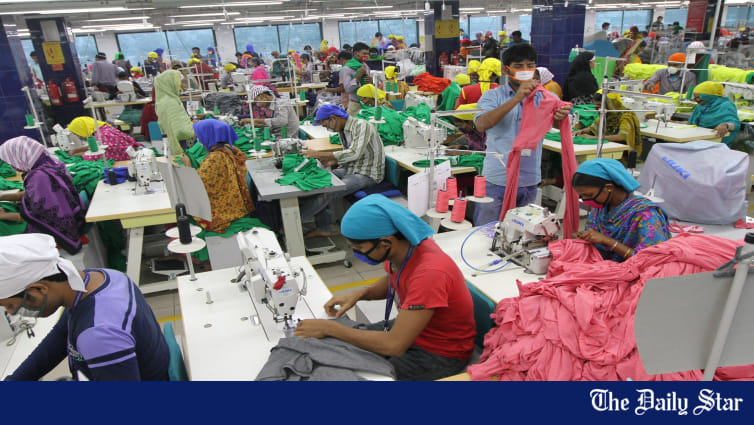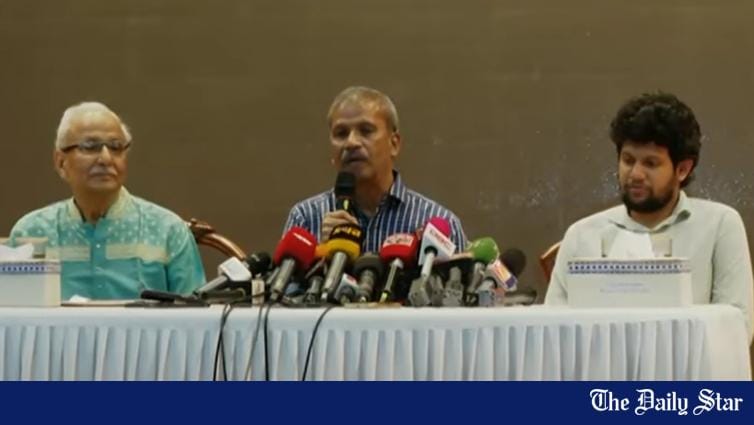Saif
Senior Member
- Messages
- 17,422
- Likes
- 8,377
- Nation

- Residence

- Axis Group


American trade platforms demand reforms to protect labour rights
The American Apparel & Footwear Association (AAFA) and Fair Labor Association (FLA) have urged the interim government of Bangladesh to take critical and long-lasting steps towards reforms for furthering worker rights of international standards. .The AAFA is an American trade association re
American trade platforms demand reforms to protect labour rights

American trade platforms recommended that the government of Bangladesh swiftly adopt a transparent and regular annual minimum wage review mechanism for the garment, footwear, and travel goods industries. Photo: Star/file
The American Apparel & Footwear Association (AAFA) and Fair Labor Association (FLA) have urged the interim government of Bangladesh to take critical and long-lasting steps towards reforms for furthering worker rights of international standards.
The AAFA is an American trade association representing apparel, footwear and other sewn products companies, and their suppliers, who together have an annual turnover of $470 billion.
The FLA is an international network of companies, universities, and civil society organisations collaborating to promote human rights at work.
The two platforms in a letter sent to Professor Muhammad Yunus, chief adviser to the interim government, on Tuesday urged for resolving three important issues relating to labour rights in Bangladesh.
The first was for the immediate release of those who remain under arrest from the Fall 2023 protests over the minimum wage and withdrawal of all criminal charges against them.
"We further urge the interim government to end the threat of arrest for thousands more workers related to the Fall 2023 minimum wage protests by immediately cancelling the 'First Information Reports' related to those workers," according to the letter.
Steve Lamar, president and chief executive officer (CEO) of AAFA, and Jeff Vockrodt, president and CEO of FLA, also called upon the government to drop and resolve criminal charges brought against labour organisers.
They include Babul Akhter, general secretary of the Bangladesh Garments and Industrial Workers Federation, and Jewel Miya, a labour organiser with Bangladesh Independent Garment Workers Union Federation, who were both arrested in 2023 for advocating for higher wages.
Secondly, they recommended that the government this year swiftly adopt a transparent and regular annual minimum wage review mechanism for the garment, footwear, and travel goods industries.
This should involve all stakeholders – employers, the government, and workers (independent unions, worker groups/representatives), they said.
In contrast to the current five-year review, this new mechanism will enable the government to better respond to current economic circumstances without imposing sudden, huge burdens on the industry or workers, they added.
Moreover, it will promote short and long-term health and stability of the Bangladeshi garment, footwear, and travel goods industry, said the duo.
"We also encourage the government to consider giving guidance to employers to pay missed wages to workers for the four days missed during the declared holiday," they said.
Thirdly, the AAFA and the FLA urged to promote harmonious industrial relations and prevent future unrest.
"We urge the interim government to quickly restart tripartite discussions on the Bangladesh labour act and bring the law into line with international labour standards," they said.
Those reforms should simplify the process for the creation and registration of independent trade unions, including a significant reduction of the registration threshold, they said.
"We also urge the government to increase penalties for unfair labour practices and extend full labour rights to workers in the export processing zones (EPZ)," they said.
"We believe improving worker rights goes hand in glove with promoting a successful Bangladesh garment, footwear, and travel goods industry now and in the years to come," the letter also said.
The trade bodies appreciated Yunus's comments both in support of the garment, footwear, and travel goods industry, and in support of the workers who are the backbone of that industry.
His comment that Bangladesh should reform local labour laws to align with the ILO standards is very welcome, they said.
They said as Yunus was shepherding Bangladesh through this transition and into a new era, they look forward to working closely with him to ensure that both the protection of workers' rights and growth of the industry are paramount.
The leaders also said they fully recognise the important place that Bangladesh holds as the third-largest supplier of garments to the US as well as a fast-growing supplier of footwear and travel goods.
The favourable trade partnerships and spirit of collaboration that underpin these markets has brought shared prosperity and economic growth, the letter also said.
American trade platforms recommended that the government of Bangladesh swiftly adopt a transparent and regular annual minimum wage review mechanism for the garment, footwear, and travel goods industries. Photo: Star/file
The American Apparel & Footwear Association (AAFA) and Fair Labor Association (FLA) have urged the interim government of Bangladesh to take critical and long-lasting steps towards reforms for furthering worker rights of international standards.
The AAFA is an American trade association representing apparel, footwear and other sewn products companies, and their suppliers, who together have an annual turnover of $470 billion.
The FLA is an international network of companies, universities, and civil society organisations collaborating to promote human rights at work.
The two platforms in a letter sent to Professor Muhammad Yunus, chief adviser to the interim government, on Tuesday urged for resolving three important issues relating to labour rights in Bangladesh.
The first was for the immediate release of those who remain under arrest from the Fall 2023 protests over the minimum wage and withdrawal of all criminal charges against them.
"We further urge the interim government to end the threat of arrest for thousands more workers related to the Fall 2023 minimum wage protests by immediately cancelling the 'First Information Reports' related to those workers," according to the letter.
Steve Lamar, president and chief executive officer (CEO) of AAFA, and Jeff Vockrodt, president and CEO of FLA, also called upon the government to drop and resolve criminal charges brought against labour organisers.
They include Babul Akhter, general secretary of the Bangladesh Garments and Industrial Workers Federation, and Jewel Miya, a labour organiser with Bangladesh Independent Garment Workers Union Federation, who were both arrested in 2023 for advocating for higher wages.
Secondly, they recommended that the government this year swiftly adopt a transparent and regular annual minimum wage review mechanism for the garment, footwear, and travel goods industries.
This should involve all stakeholders – employers, the government, and workers (independent unions, worker groups/representatives), they said.
In contrast to the current five-year review, this new mechanism will enable the government to better respond to current economic circumstances without imposing sudden, huge burdens on the industry or workers, they added.
Moreover, it will promote short and long-term health and stability of the Bangladeshi garment, footwear, and travel goods industry, said the duo.
"We also encourage the government to consider giving guidance to employers to pay missed wages to workers for the four days missed during the declared holiday," they said.
Thirdly, the AAFA and the FLA urged to promote harmonious industrial relations and prevent future unrest.
"We urge the interim government to quickly restart tripartite discussions on the Bangladesh labour act and bring the law into line with international labour standards," they said.
Those reforms should simplify the process for the creation and registration of independent trade unions, including a significant reduction of the registration threshold, they said.
"We also urge the government to increase penalties for unfair labour practices and extend full labour rights to workers in the export processing zones (EPZ)," they said.
"We believe improving worker rights goes hand in glove with promoting a successful Bangladesh garment, footwear, and travel goods industry now and in the years to come," the letter also said.
The trade bodies appreciated Yunus's comments both in support of the garment, footwear, and travel goods industry, and in support of the workers who are the backbone of that industry.
His comment that Bangladesh should reform local labour laws to align with the ILO standards is very welcome, they said.
They said as Yunus was shepherding Bangladesh through this transition and into a new era, they look forward to working closely with him to ensure that both the protection of workers' rights and growth of the industry are paramount.
The leaders also said they fully recognise the important place that Bangladesh holds as the third-largest supplier of garments to the US as well as a fast-growing supplier of footwear and travel goods.
The favourable trade partnerships and spirit of collaboration that underpin these markets has brought shared prosperity and economic growth, the letter also said.








